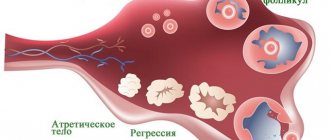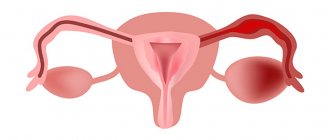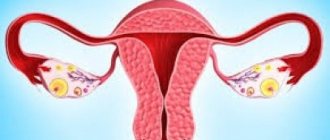A pregnant woman goes through many trials before giving birth to a healthy baby.
Throughout pregnancy, she is often bothered by pain, the most dangerous of which is considered to be pain in the vagina. If the vagina hurts during pregnancy, this does not always indicate any pathology. It is necessary to consider in more detail the factors that can provoke discomfort in the perineum in the expectant mother.
Pain in the vagina during pregnancy - normal or pathological
Muscle pain in the perineum in pregnant women cannot be called a rare occurrence. Most often, this symptom is observed in the third trimester, at 7-9 months, when the fetus is already developed and ready for birth. The first trimester is characterized by physiological changes in a woman’s body, which can also cause discomfort. Such pain does not last long and does not threaten the life of the mother or baby.
But not all causes of pain are harmless. Sometimes women face problems such as infections in the genitourinary system, uterine hypertonicity, or ectopic pregnancy. If there are no periods or the external genitalia hurt after sex, then we can talk about dangerous pathologies developing in the body.
The cutting and acute nature of the discomfort indicates pathologies that require immediate treatment, so a pregnant woman should always listen to her feelings. If your vaginal muscles hurt, self-medication is not recommended. It is better to immediately study the possible causes of this phenomenon and take appropriate measures to eliminate it.
But there is also no need to worry prematurely. Frequent vaginal examinations by a gynecologist, inaccurate sexual intercourse and failure to comply with personal hygiene rules can lead to painful symptoms, sometimes quite acute, but short-term.
Discharge
During pregnancy, discharge from the genital tract can be normal, physiological, or it can become pathological.
Normal discharge
Since during pregnancy the female body is under the control of the hormone progesterone, it is precisely this hormone that is to blame for changes in the quantity and quality of vaginal secretion.
Copious, white or transparent odorless discharge, not accompanied by itching, burning, pain and not causing discomfort to a pregnant woman, is considered normal.
At the end of pregnancy, mucous discharge appears, which is a harbinger of labor. This is also a variant of the norm. They say that the birth of the baby is coming soon. You shouldn’t be afraid of them, but you should hurry to the maternity hospital.
Insufficient hydration
Often pregnant women face the problem of insufficient hydration or dryness in the vagina. This is due to the following factors:
- changes in hormonal levels, leading to a decrease in the number of lactobacilli and a change in the acidic environment of the vagina;
- incorrect selection of hygiene products or an allergic reaction to them;
- violation of intimate hygiene rules;
- if vaginal dryness appears during sexual intercourse, the cause should be sought in the psycho-emotional sphere.
Treatment for dryness involves eliminating the underlying cause.
Features of pathological discharge
Their appearance serves as a signal to immediately consult a doctor:
- White, copious, curd-like discharge, sometimes with a sour odor, occurs with thrush. When examining a smear analysis, mycelial threads or fungi of the genus Candida are detected. Typically, discharge from candidiasis is accompanied by severe itching and burning in the vagina. Itching may intensify at night, after sexual intercourse or hygiene procedures. In this case, treatment for thrush is necessary, especially if the pregnancy occurs with complications. Antifungal drugs are used for treatment. The doctor prescribes medications after the examination. After treatment, it is necessary to restore the normal balance of vaginal microflora.
- Yellow or yellow-green , foamy discharge with an odor, severe itching and a burning sensation in the genital area is the main symptom of sexually transmitted diseases - trichomoniasis and gonorrhea. The diagnosis is established using microscopic and bacteriological examination of a smear. Treatment is carried out with antimicrobial and antibacterial drugs together with the sexual partner.
- Spotting, dirty-brown discharge indicates an impending miscarriage or the threat of premature birth. If you leave them unattended, you can lose the child. Timely access to an obstetric hospital contributes to a favorable pregnancy outcome.
- Bloody vaginal discharge is a very dangerous symptom that can serve as a sign of placental abruption or an incipient miscarriage. Bloody discharge poses a threat to the life of mother and child. When they appear, you need to urgently call an ambulance.
- Liquid, watery discharge from the genital tract during a preterm pregnancy may be premature release of amniotic fluid. After the water breaks, there is always a threat that the baby will be born prematurely. Urgent hospitalization is indicated. If your water breaks late in pregnancy, you should go to the hospital immediately. When water breaks during a full-term pregnancy, there is a risk of prolapse of the umbilical cord or small parts of the fetus. Thus, the appearance of thin, watery discharge, regardless of the stage of pregnancy, is an indication for emergency hospitalization.
If the expectant mother has discovered unpleasant sensations in her vagina, causing her pain and changing her quality of life, as well as pathological discharge, there is no need to try to cope with them on her own. Some symptoms can be harmful to the woman and her baby and can even be fatal. It is important to seek medical help promptly.
What pain may indicate - the main causes
There are several main reasons that cause pain in women in the early stages. If a woman notices itching, then the problem lies in the presence of an infection in the genitourinary system. Often the source of discomfort is located in the rectum, and pain is felt in the vagina.
At any week of pregnancy, a woman can become infected with a sexually transmitted disease or urogenital infection. Mycoplasma, Candida fungus, ureaplasma, chlamydia or genital herpes provoke inflammation in the body and cervix, damaging the appendages, vulvar mucosa and vagina. Trauma to the tissue causes discomfort - the main symptom of a sexually transmitted disease.
The inflammatory process in the bladder or vagina is manifested by discharge with an unpleasant odor. In this case, the discharge is abundant and thick, and mucopurulent inclusions may be observed in it. The woman feels an unpleasant burning sensation, itching and stabbing pain.
Infection and inflammation
Sexual infection is the most common cause of pain in the vagina in pregnant girls. The aching pain may be accompanied by white discharge with a sour odor and itching in the external genitalia.
Since pregnancy provokes changes not only in hormonal levels, but also in the entire body, a woman may develop thrush, scientifically called candidiasis. Fungi of the genus Candida are present in the body of even a healthy woman, but due to frequent stress and decreased immunity, their number increases sharply, which causes illness.
If an infection in the genitourinary system is not treated in a timely manner, it will become chronic and will periodically worsen, causing discomfort and discomfort. When carrying a child, this phenomenon is dangerous, because microbes can prevent the fetus from developing properly.
Another cause of discomfort in the perineum is vaginitis. This disease is considered a non-infectious inflammation of the genital organs and is characterized by swelling of the mucous membranes. It occurs when wearing unnatural underwear or against the background of mechanical microtraumas received during intimacy.
The doctor’s task is to identify the causative agent of the infectious process and begin timely treatment.
Ectopic pregnancy
The pathology in question is difficult to diagnose, because its manifestations are identical to normal pregnancy: morning sickness, swelling and tenderness of the mammary glands and dizziness. But a little later, the woman experiences discomfort in the perineum, a pulling sensation in the lower abdomen and lumbar region, and spotting appears.
Such symptoms should alert the girl and become a reason for urgent contact with a specialist. At this stage, it is important to correct the problem in a timely manner, otherwise there is a risk of developing life-threatening complications.
Natural pain
Discomfort can be caused by physiological reasons. Women who experience nagging pain in the vaginal area in the early stages immediately suspect the presence of some pathology in the body. But such signs are considered a variant of the norm at this stage. This is a physiological reaction of the body to the process of fertilization and consolidation of the embryo in the uterus.
At 18-20 weeks, the expectant mother feels pain caused by tissue stretching, as intensive growth of the fetus begins and the uterus enlarges, which puts pressure on the vagina and nearby internal organs. At this time, changes are also observed in the ligamentous apparatus. But if pregnancy is not complicated by pathologies, then such changes do not cause severe discomfort.
Immediately before giving birth at 37,38, 39 weeks, the woman also experiences pain. They are explained by the fact that the body of the expectant mother is actively preparing for the birth of the baby. Often the causes of pain are psychosomatic factors provoked by fear of childbirth.
Change in microflora
Normally, lactobacilli (lactic acid bacteria) actively multiply in the vagina during pregnancy under the influence of estrogen hormones. Estrogenic activity leads to the accumulation of glycogen in the cells of the vaginal epithelium. Lactobacilli break down glycogen during their life processes, resulting in the formation of lactic acid. Therefore, the pH environment in the vagina is always acidic.
Bifidobacteria and single leukocytes coexist with lactobacilli. All these are components of normal microflora.
Cases when the number of lactic acid bacteria decreases, the number of leukocytes increases, pathogenic microorganisms prevail, or fungal spores appear indicate vaginal dysbiosis. As a result of an imbalance of microflora, a woman complains of heavy vaginal discharge during pregnancy, sometimes with an unpleasant odor, pain, itching and burning.
This situation serves as a signal to immediately consult a doctor.
In addition, infection of the vagina often causes spontaneous miscarriage or untimely rupture of amniotic fluid, which leads to premature birth.
Diagnosis by type of pain
After examining and interviewing the patient, the gynecologist can make a preliminary diagnosis based on the nature of the pain:
- Stitching pain is most often caused by the growth of the uterus, muscle strain and hormonal changes in the body. Discomfort bothers you when you cough or sneeze, but if the pain is not severe, then there is no need to worry. But sometimes such sensations indicate uterine hypertonicity, characterized by bloody discharge. In this case, you should urgently contact a specialist.
- Nagging pain is an indirect sign of inflammation of the genitourinary system or appendages, or the presence of an ovarian cyst in a woman. If the sensations are cramping in nature and gradually intensify, then it is better to consult a gynecologist so as not to harm the baby.
- Cutting and shooting pain is often considered normal, but it may also indicate some pathological processes in the body. For example, inflammation, infection or mechanical damage to the mucosa.
During diagnosis, it is important to consider how long the pain lasts and how often it occurs. If the discomfort is mild and infrequent, then it indicates natural processes.
How to cope with the disease - the main methods of treatment
If frequent and intense pain in the vaginal area occurs, a woman is advised to consult a gynecologist. Due to the fact that many medications cannot be taken during pregnancy, self-medication is prohibited.
Doctor's recommendations
Severe pain that occurs with particular frequency is considered a reason to visit a doctor.
A woman must undergo a full diagnosis, during which a specialist will identify the true cause of the discomfort. If the gynecologist cannot make a final diagnosis, then he can involve specialists of a different, narrower profile.
If the doctor, after weighing all the possible risks for mother and baby, decides to carry out treatment, he will prescribe the following medications:
- Antibiotics that kill bacteria and eliminate inflammation.
- Topical antiseptics that fight bacteria, viruses and fungi.
- Keratoplasty, which accelerates the healing of wounds and microcracks.
- Antispasmodics that reduce pain and fight hypertension.
- Vitamins that have a positive effect on the nervous system of a pregnant woman.
In cases where discomfort in the perineum is caused by an ectopic pregnancy, doctors often perform surgical interventions to prevent rupture of the fallopian tube. If this process cannot be prevented, then dangerous complications arise that threaten the patient’s life.
Traditional methods of treatment
When using traditional medicine methods, keep in mind that decoctions and tinctures should not completely replace traditional methods of therapy. They are used only as symptomatic treatment: to eliminate burning, local inflammatory processes or to accelerate the healing of damaged tissue.
The following medicinal herbs and remedies are effective:
- yellow egg capsule;
- round eucalyptus;
- calendula;
- honey;
- sea buckthorn oil.
It is forbidden to use traditional medicine before the doctor makes a final diagnosis. This is explained by the fact that tampons with solutions can blur the symptoms and interfere with identifying the causative agent of the pathology.
Diagnosis and management of pain during pregnancy
- Severe pain that has developed periodicity is a serious reason for visiting a medical facility. Situations where unpleasant sensations inside the vagina are accompanied by a characteristic odor may indicate the presence of an infection in the body and the need for examination and further treatment.
- If the pain is intense and constant, it is imperative to undergo diagnostics to identify the reasons that led to this condition.
- There are situations when a gynecologist cannot independently determine the nature of the pain that occurs. Such situations often require the involvement of specialists who have a narrow specialty and with their help the final diagnosis is determined.
It is worth understanding that pain in the vagina during pregnancy is one of the most important reasons for visiting specialized medical institutions. A timely visit to a specialist can save the life of both the child and the mother.
Prevention of female genital pain
To prevent the appearance of stabbing pains and various inflammatory diseases of the female reproductive system, you should follow the rules of prevention.
Here are the main ones:
- Avoid casual sex.
- Use personal protective equipment during intimate intimacy.
- Do not take antibiotics without a doctor's prescription.
- Lead a healthy lifestyle.
- Avoid hypothermia.
- Always treat inflammatory and infectious diseases.
- Correct hormonal imbalances.
- Empty your bladder and bowels in a timely manner.
Watch a detailed overview of various pains during pregnancy in this video:









